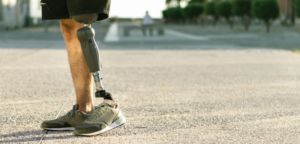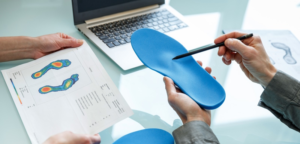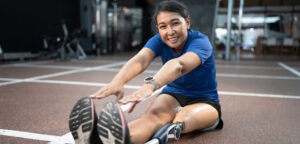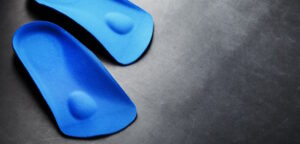Determining Which Type of Prosthetic Leg Individuals Qualify For
Prosthetics are available in a variety of designs that can accommodate a range of ability levels. In fact, there are several prosthetic options that offer higher levels of functioning, such as running and other complex motions.
Individuals who have undergone a below-the-knee or above-the-knee amputation want to know what to expect after amputation surgery, including their estimated time of recovery and when they can walk again. Reclaiming mobility is a big part of the journey; however, the process isn’t as simple as picking out a prosthesis.
For most people, the purchase of a prosthetic leg or other prosthesis must be run through their insurance carrier. Before reaching that step, their prescribing physician must determine their functional level. After defining the four functional levels of prosthetics, we will provide information about where to find custom orthotics and prosthetics near you in Overland Park and their advantages over generic options.
The Four Functional Levels and How They’re Defined
A patient’s functional level correlates with the physical and functional capabilities they possessed prior to and after amputation surgery. For example, a professional athlete qualifies as having a high functional level. Conversely, a person leading a more sedentary lifestyle is usually classified as having a lower functional level.
A patient’s activities of daily living (ADL) are key when determining functional level. It factors in:
- The patient’s current functional capabilities.
- The patient’s expected functional potential when using a prosthesis.
- A statement that the patient will achieve their defined functional state within a specific timeframe.
Defined functional levels of amputees provides Medicare, Medicaid, Veterans Affairs (VA), and private insurance companies parameters to allow recommended components at various levels or features for different types of feet or knees.
Medicare’s functional levels for lower extremities include:
Level 1 – Household Ambulator: The patient has the ability or potential to use their prosthetic leg during ambulation on level surfaces at a fixed cadence.
Level 2 – Limited Community Ambulator: The patient has the ability or potential to use their prosthetic leg for ambulation and to navigate low level barriers, such as uneven surfaces, stairs, and curbs.
Level 3 – Unlimited Community Ambulator: The patient has the ability or potential to use their prosthetic leg for ambulation using a variable cadence, can traverse most environmental barriers, and may have physical activities related to exercise, therapy, or their vocation that demands function beyond level 1 and level 2.
Level 4 – Child, Active Adult, or Athlete: The patient has the ability or potential to use their prosthetic leg for advanced ambulation that exhibits high impact and/or energy levels.
After the patient’s prescribing physician determines their functional level, they qualify for specific prosthetic components at or below their functional level. For example, if a patient has qualified for a functional level 4, they qualify for all functional level 1, 2, and 3 components. Functional level 2 can qualify for levels 1 and 2. Functional level 1 only qualifies for level 1.
Consulting with an ABC-certified prosthetist is the best thing to do once the patient knows their functional level. A prosthetist works with amputees to help them realize their mobility goals and regain their independence. In addition to fitting patients for their prosthesis, a prosthetist helps them locate resources for learning to walk again and can address questions about adapting to their new life using a prosthetic leg.
How to Find Advanced Prosthetics and Orthotics Near You in Overland Park
Custom prosthetics and orthotics provide life-enhancing benefits to amputees and those with chronic foot conditions. If you’ve been searching for prosthetics near you in Overland Park, Dan Cotton and the team at Cotton Orthotic and Prosthetic Associates have helped countless individuals reclaim their mobility and quality of life.
Patients can expect their solution to deliver:
- A personalized fit
- Enhanced functionality and performance
- Improved comfort
- Customized aesthetics
Customized prosthetics and orthotics provide functional advantages and a higher level of comfort over generic devices. Those who are ready to discover their options should reach out to Cotton Orthotic and Prosthetic Associates to arrange a consultation.
With over 20 years of industry experience, Dan Cotton has advanced knowledge of prosthetics and orthotics that patients find invaluable during their transition – no matter where they are on their journey. Dan will field questions about how insurance will cover your prosthetic leg or other device. He can also provide information about prosthetic care and maintenance and how often it will need to be replaced.
Contact Cotton Orthotic and Prosthetic Associates today by using the contact form or by calling (913) 338-2672. Our main office is located at 6311 West 110th Street in Overland Park, KS.







